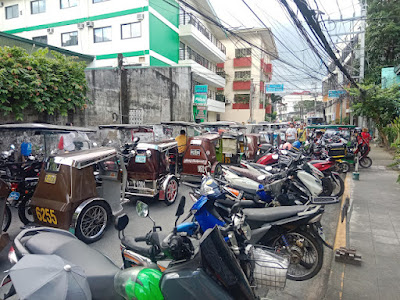On the never-ending traffic in Metro Manila and other cities, many people blame car owners then blame other agencies like MMDA, DOTr. I think these analysis are partly wrong and hence, their proposals are unwise or will not address the traffic problem. Why, well consider this situation.
If you live in UP Village, or Filinvest QC and going to Makati Ayala/Buendia or BGC and if you commute this is your route: (1) tricycle from house to Philcoa or COA, (2) jeep from Philcoa to MRT station, (3) MRT Quezon Ave to MRT Ayala station, (4) jeep to Ayala or bus to BGC. Going back home, reverse the process, total eight rides. Each day. If you are in formal barong clothes or carrying a laptop or valuable papers, endure this? Especially during rainy months? Most car-owning people will say No.
So even if we have the most modern MRT trains and stations by tomorrow, most people will still drive their cars.
LGUs create tricycle route monopoly. From house to Philcoa, no jeepney or aircon van, only tricycles.
LTFRB creates jeepney, bus route monopoly. So from Philcoa, only jeepney will serve, not sure if aircon vans are allowed to pick up short-distance passengers like Philcoa-MRT.
And many activists or even some government officials pushing for "inclusive transportation", "inclusive growth", etc will be averse to remove the tricycles, remove the jeepneys, diesel or electric.
Guys, do NOT blame car owners. They know their priorities, like their own or family safety, convenience, because government has created favoritism and transpo route monopolies, which make public transpo inconvenient, even less safe.
My own proposals for these two problems:
(1) Deregulate routes by bus/van companies. LTFRB will only give franchise to transpo companies, monitor their compliance but not dictate where the vehicles can go and cannot go.
(2) Demonopolize routes within LGUs. So current routes by tricycles can be served by non-aircon jeeps or aircon vans.This way, I think tricycles will die a natural death because passengers will just stop riding them. No need for legislation or City ordinances to remove tricycles.
About tricycle drivers and operators who will lose their jobs, people are rational. Tricycle drivers who see that passengers no longer patronize them because their route monopoly has been removed, they usually find other jobs. Remember the former typewriters who lost jobs when computers became more accesible to people. Or telegram companies and employees when people shifted to pagers, and when people shifted to cellphone communication via emails or FB messenger, IG, twitter, etc. All of those people whose companies and sub-sectors have vanished, they found new jobs somewhere.
The previous lavanderas whose jobs have vanished with the introduction of laundry washing and drying machines, the previous manual dishwashers in restaurants whose jobs have vanished with the introduction of dishwashing machines. Many more old jobs now replaced by machines, people move on, upgrade their skills. Previously bicycle or motorcycle mechanics later become cars and trucks mechanics, even heavy machine mechanics with much higher pay. People are rational. Hunger did not happen to typewriters, pager operators, telegram delivery guys, lavanderas, etc. They see the trend and it's slow moving, they have time to adjust. Just don't introduce wider government endless subsidies, people can become lazy.
More about tricycles
If government will keep protecting tricycles by giving them route monopoly, we shall have tricycles in our roads for the next 100 years or more. Tricycles are among the major sources of traffic congestion because they often counterflow then cut the motorists with just 1-2 inches space, forcing other motorists to stop or slow down to give way.
Not immediate nor forcible phaseout of tricycles. Like typerwriters, pagers, telegrams, the phaseout was slow, taking several years. Current new tricycles will depreciate enough before the owners decide to set aside and sell at junk shops. Or convert as "garong", cargo only side car of motorcycles.
The rural tricycles are often worse than urban tricycles. Most provincial roads now are 4-lanes, 2 lanes each side. Inner lane shoul be overtaking/fast lane, outer lane for slow vehicles. Most tricycles in the provinces occupy the inner or fast lane, forcing cars to overtake at the outler lane, or go against the on-coming vehicles. LGUs are supposed to apprehend these tricycles bec they are the ones that granted permit but LGUs not doing their job, neither the local police.
Tollroads are good. Exclusive transpo, not inclusive transpo. Tricycles, small motorcycles, bicycles, kariton, tractors, are prohibited. And travel is safer, faster, convenient. Mali yang mga "inclusive transpo", we often get inclusive chaos.
------------
Transport Econ 23, Penalizing commuters with far away bus/LRT stops, February 12, 2020

Correct. All this talk of "inclusive transpo", "move as one", etc. is really just a product of SOCIALIST thinking (and lazy thinking) applied to the transpo sector.
ReplyDeleteNo wonder they love to blame car owners and even highlight that car owners are something like just 1% of the population.